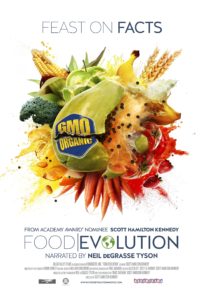 Film Review: Food Evolution
Film Review: Food Evolution
Studio: Black Valley Films with Boomdozer, Inc.
Director: Scott Hamilton Kennedy
2016
Reviewed by Adrienne Raimo, RDN
Description: The film Food Evolution asserts that genetically modified organisms (GMOs), despite a controversial reputation, are a safe and intelligent solution to feeding an over-populated world.
Synopsis: Through his film, Food Evolution, the director aims to furnish some answers to the questions of how the science behind GMOs might be used to feed the earth’s growing population. While portraying those concerned about the health and environmental impacts of GMOs as misinformed and fear-mongering, he champions the developments of certain GMO foods as a way to improve crop resistance to disease and drought. The film tries to assume an objective, evidence-based analysis of the science behind GMOs as a safe and reasonable solution for looming issues of food security and sustainability as well as environmental health.
Pros and Cons:
Pros: The cinematography is fantastic – very interesting to the eye and keeps the viewer’s attention.
Cons: The data provided in the film focuses on safety issues relating to human health (mainly asserting that there’s no proof of damage to the human body). Besides the topic of human health, there are other impacts of GMOs that were not discussed. Marion Nestle, who earned both a PhD in molecular biology and an MPH in public health nutrition from the University of California, Berkeley, calls the movie “propaganda” and asked the director to remove her interview from the movie on the grounds of her comment being taken out of context. As she mentions in her blog, genetic engineering also needs to include discussion of “monoculture; the effects of industrial agriculture on the environment and climate change; the possible carcinogenicity of glyphosate (Roundup); this herbicide’s well documented induction of weed resistance; and the how aggressively this industry protects its self-interest and attacks critics, as this film demonstrates.”
The film aims for us to equate transgenic biological manipulation to selective breeding, but this is a false equivalence. Injecting genetic material from another species is not the same as our recent ancestors selecting the heartiest strains of wheat or the sturdiest cows on the farm for further breeding.
Safety is the main talking point. In the view of the GMO industry and this film, if GMOs are safe (or haven’t yet been proven unsafe), they should be fully accepted and no other argument or concern is relevant. There is little discussion about how GMOs would address food security or impact biodiversity, workers’ health, water quality, monoculture and monocropping, resistant weeds and traditional seed sharing. The film also fails to mention how the industry spends a fortune on lobbying and in working against labeling transparency.
Bottom line: Science and politics are often entwined, which makes it very hard to get to the truth and, hence, why we have an abundance of confusion around these issues. Critical thinking goes way beyond watching this film, or any film, and taking the assumptions laid out as your own. Do your own research. Look at who funds studies. Always ask the question “Who stands to benefit?” The maxim “you are what you eat” encourages us to consider the impact that organic and GMO foods can have on our long-term health. Choose carefully: Not only does what you put in your mouth ultimately become your cells, tissues and organs, but the choices we make have impacts far beyond our own bodies.
If nothing else, this movie should encourage people on both sides of the fence to look beyond “feelings” and do more research to support, or modify, their current positions on the issue of GMOs and human, soil and environmental health.



